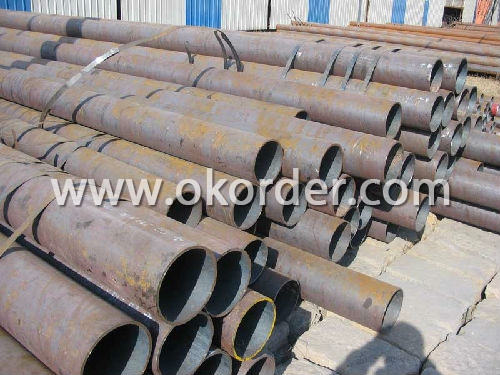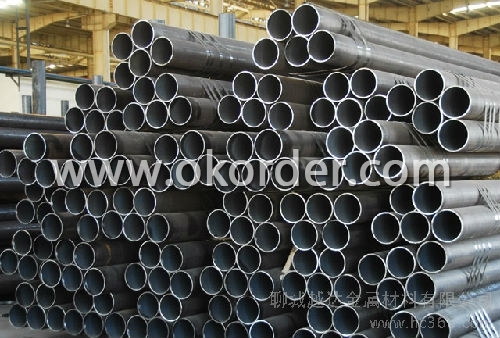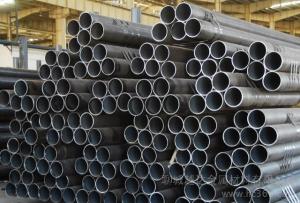Seamless Steel pipes for Gas Cylinder
- Loading Port:
- China Main Port
- Payment Terms:
- TT or LC
- Min Order Qty:
- 5mt m.t.
- Supply Capability:
- 5000 Tons Per Month m.t./month
OKorder Service Pledge
OKorder Financial Service
You Might Also Like
Seamless Steel pipes
Application of Seamless Steel Pipe for Gas Cylinder
The company products including seamless steel gas cylinder
for industry and medical gas use. We can make cylinder
Standard of Seamless Steel Pipe for Gas Cylinder
apply to standard of DOT3AA, JIS8241, EN1964,ISO9809,GB5099, KSB6210.
Certificate of Seamless Steel Pipe for Gas Cylinder
CCS,BV, LLODY'S, ABS.
Description of Seamless Steel Pipe for Gas Cylinder
Standard | GB5099 |
Material | 34Mn2V/37Mn/30CrMo |
Nominal Diameter | 219/232/267/279/325(mm) |
Water Capacity | 20-80(L) |
Nominal Height | 815-1780(mm) |
Nominal Weight | 30.5-103(kg) |
Service Pressure | 15/20(MP) |
Wall Thickness | 4.7-7.0(mm) |
Packing of Seamless Steel Pipe for Gas Cylinder
Black paint or varnish ,plastic caps with the both ends


- Q:How are steel pipes repaired if they develop leaks?
- Steel pipes can be repaired if they develop leaks through various methods such as welding, clamping, or using epoxy compounds. The specific repair technique depends on the size and location of the leak as well as the type of pipe, and it is typically carried out by trained professionals with the necessary equipment and expertise.
- Q:How are steel pipes used in the construction of dams and water reservoirs?
- Steel pipes are used in the construction of dams and water reservoirs primarily for their strength and durability. They are commonly used to transport water within the dam or reservoir, as well as for drainage systems. Steel pipes are also utilized for the construction of intake and outlet structures, penstocks, and other components that require a robust and reliable material to withstand the high pressure and heavy loads associated with dam operation.
- Q:How are steel pipes used in the manufacturing of fire sprinkler systems?
- Steel pipes are commonly used in the manufacturing of fire sprinkler systems due to their durability and resistance to high temperatures. These pipes are used to transport water or other fire suppressants from the water supply to the sprinkler heads. The steel pipes are able to withstand the pressure and heat generated during a fire, ensuring a reliable and effective fire suppression system.
- Q:How are steel pipes recycled at the end of their life cycle?
- Steel pipes are typically recycled at the end of their life cycle through a process called steel recycling. This involves collecting the used pipes, separating them from other materials, and then melting them down to be formed into new steel products. The recycling process not only helps conserve valuable resources but also reduces the need for new steel production, making it an environmentally sustainable solution.
- Q:What is the difference between ERW and SAW steel pipes?
- ERW (Electric Resistance Welded) steel pipes are manufactured by rolling metal sheets into a tube shape and then welding the edges together using an electric current. On the other hand, SAW (Submerged Arc Welded) steel pipes are produced by placing a metal plate in a welding machine with a submerged arc welding process. The key difference lies in the welding technique used, with ERW pipes having a welded seam along the length, while SAW pipes have a more uniform and continuous weld. This difference in welding method also affects the overall strength and durability of the pipes, making them suitable for different applications.
- Q:How are steel pipes used in the petrochemical industry?
- Steel pipes are commonly used in the petrochemical industry for various purposes such as transporting and distributing fluids and gases, as well as providing structural support for equipment. They are particularly preferred due to their high strength, durability, and resistance to corrosion, making them suitable for handling harsh and corrosive substances.
- Q:What are the lengths of scaffold steel tubes?
- Scaffolding steel pipe standard length is 6 meters, for easy use, respectively, 6 meters, 3 meters, 2 meters, 1.5 meters, 1 meters, etc., if there is a special length, you need to intercept.
- Q:Are steel pipes suitable for underground nuclear waste storage?
- Steel pipes are not suitable for underground nuclear waste storage. While steel is a strong and durable material, it is not resistant to corrosion when exposed to certain types of nuclear waste. Over time, the radioactive materials can corrode the steel pipes, leading to potential leaks and contaminating the surrounding environment. Additionally, steel pipes are not designed to withstand the extreme temperatures and pressures that can occur in nuclear waste storage facilities. Therefore, alternative materials such as corrosion-resistant alloys or concrete are typically used for underground nuclear waste storage to ensure the containment and isolation of the hazardous materials.
- Q:How do steel pipes compare to other pipe materials like PVC or copper?
- Steel pipes have several advantages over other pipe materials like PVC or copper. Firstly, steel pipes are incredibly durable and can withstand high levels of pressure and extreme temperatures, making them suitable for a wide range of applications. Secondly, steel pipes have excellent resistance to corrosion, which ensures their longevity and reduces the need for frequent maintenance or replacement. Additionally, steel pipes have a higher strength-to-weight ratio compared to PVC or copper, making them more robust and capable of handling heavy-duty tasks. However, steel pipes can be more expensive and require special equipment for installation. Overall, steel pipes are a reliable and versatile option that offers superior durability and performance compared to other pipe materials.
- Q:There are multiple welded galvanized steel pipe outer diameter 108mm wall thickness 4mm length of 6 meters
- Galvanized steel pipe wall thickness weight outer diameter 108mm 4mm 6 meters in length is about 10.26*6*1.06=65 kg.Kg/m= (outside diameter mm-, wall thickness mm) * wall thickness mm*0.02466= (108-4) *4*0.02466=10.26 kg / MBecause of galvanizing, the weight is heavier than that of ordinary welded pipe 3%~6%.
1. Manufacturer Overview |
|
|---|---|
| Location | Zhejiang, China |
| Year Established | 2007 |
| Annual Output Value | Below US$1 Million |
| Main Markets | |
| Company Certifications | API;ISO9001 |
2. Manufacturer Certificates |
|
|---|---|
| a) Certification Name | |
| Range | |
| Reference | |
| Validity Period | |
3. Manufacturer Capability |
|
|---|---|
| a)Trade Capacity | |
| Nearest Port | Shanghai |
| Export Percentage | 41% - 50% |
| No.of Employees in Trade Department | 300-500 People |
| Language Spoken: | English; Chinese |
| b)Factory Information | |
| Factory Size: | 360,000 Squre meters |
| No. of Production Lines | Above 10 |
| Contract Manufacturing | OEM Service Offered;Design Service Offered |
| Product Price Range | High Average |
Send your message to us
Seamless Steel pipes for Gas Cylinder
- Loading Port:
- China Main Port
- Payment Terms:
- TT or LC
- Min Order Qty:
- 5mt m.t.
- Supply Capability:
- 5000 Tons Per Month m.t./month
OKorder Service Pledge
OKorder Financial Service
Similar products
New products
Hot products
Related keywords






























